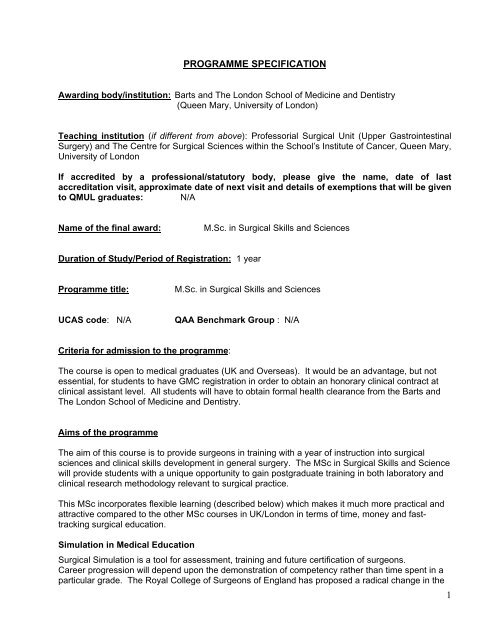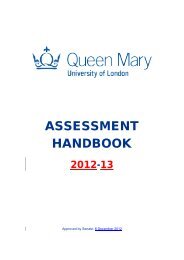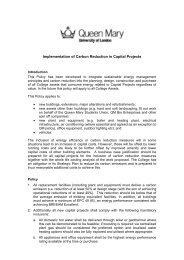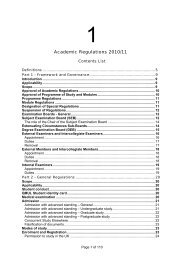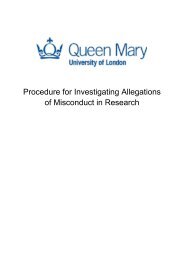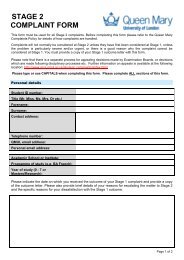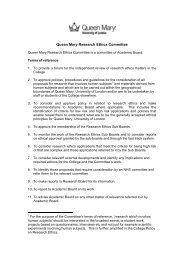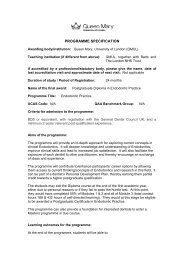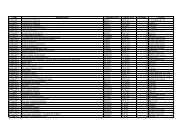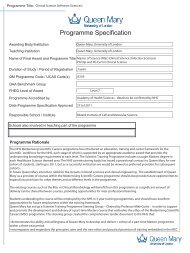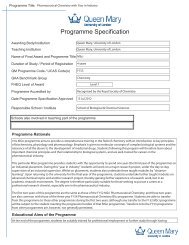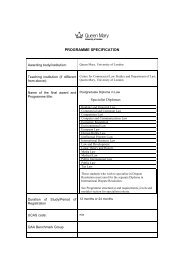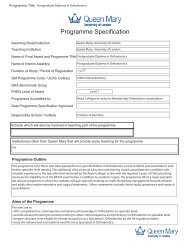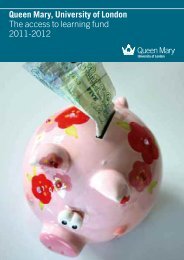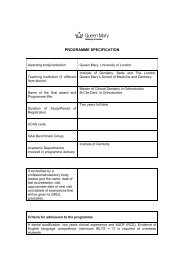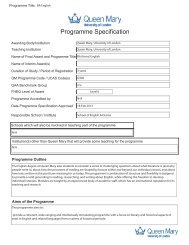PROGRAMME SPECIFICATION - Queen Mary, University of London
PROGRAMME SPECIFICATION - Queen Mary, University of London
PROGRAMME SPECIFICATION - Queen Mary, University of London
You also want an ePaper? Increase the reach of your titles
YUMPU automatically turns print PDFs into web optimized ePapers that Google loves.
<strong>PROGRAMME</strong> <strong>SPECIFICATION</strong><br />
Awarding body/institution: Barts and The <strong>London</strong> School <strong>of</strong> Medicine and Dentistry<br />
(<strong>Queen</strong> <strong>Mary</strong>, <strong>University</strong> <strong>of</strong> <strong>London</strong>)<br />
Teaching institution (if different from above): Pr<strong>of</strong>essorial Surgical Unit (Upper Gastrointestinal<br />
Surgery) and The Centre for Surgical Sciences within the School’s Institute <strong>of</strong> Cancer, <strong>Queen</strong> <strong>Mary</strong>,<br />
<strong>University</strong> <strong>of</strong> <strong>London</strong><br />
If accredited by a pr<strong>of</strong>essional/statutory body, please give the name, date <strong>of</strong> last<br />
accreditation visit, approximate date <strong>of</strong> next visit and details <strong>of</strong> exemptions that will be given<br />
to QMUL graduates: N/A<br />
Name <strong>of</strong> the final award:<br />
M.Sc. in Surgical Skills and Sciences<br />
Duration <strong>of</strong> Study/Period <strong>of</strong> Registration: 1 year<br />
Programme title:<br />
M.Sc. in Surgical Skills and Sciences<br />
UCAS code: N/A<br />
QAA Benchmark Group : N/A<br />
Criteria for admission to the programme:<br />
The course is open to medical graduates (UK and Overseas). It would be an advantage, but not<br />
essential, for students to have GMC registration in order to obtain an honorary clinical contract at<br />
clinical assistant level. All students will have to obtain formal health clearance from the Barts and<br />
The <strong>London</strong> School <strong>of</strong> Medicine and Dentistry.<br />
Aims <strong>of</strong> the programme<br />
The aim <strong>of</strong> this course is to provide surgeons in training with a year <strong>of</strong> instruction into surgical<br />
sciences and clinical skills development in general surgery. The MSc in Surgical Skills and Science<br />
will provide students with a unique opportunity to gain postgraduate training in both laboratory and<br />
clinical research methodology relevant to surgical practice.<br />
This MSc incorporates flexible learning (described below) which makes it much more practical and<br />
attractive compared to the other MSc courses in UK/<strong>London</strong> in terms <strong>of</strong> time, money and fasttracking<br />
surgical education.<br />
Simulation in Medical Education<br />
Surgical Simulation is a tool for assessment, training and future certification <strong>of</strong> surgeons.<br />
Career progression will depend upon the demonstration <strong>of</strong> competency rather than time spent in a<br />
particular grade. The Royal College <strong>of</strong> Surgeons <strong>of</strong> England has proposed a radical change in the<br />
1
arrangements for and process <strong>of</strong> assessment <strong>of</strong> surgical training. The new structure for surgical<br />
training has been described by the President <strong>of</strong> the College and its bulletin is attached (RCS<br />
Bulletin attached Ann R Coll Surg Engl (Suppl) 2004; 86: 332–333).<br />
With the modernisation <strong>of</strong> medical education and a shorter period <strong>of</strong> surgical training, combined<br />
with the shorter working week (EU working time directive) means acquisition <strong>of</strong> technical skills must<br />
occur in a shorter period. This MSc course will help accelerate the surgical training and improve<br />
surgical skills that are essential for building confidence in operating theatre. Also the proposal <strong>of</strong> a<br />
seamless training grade from completion <strong>of</strong> foundation house job years to consultant means<br />
objective techniques to test aptitude to surgery prior to entry to a training program and consolidation<br />
<strong>of</strong> experience in training for the aviation and space flight has shown that simulation and virtual<br />
reality (VR) can deliver validated training/skills acquisition opportunities for other highly responsible<br />
fields such as surgery. Since adequate training models for complex operations are not generally<br />
available, the necessity for training simulators has become acute in recent years. Dramatic<br />
increases in computer performance have made mathematical remodelling <strong>of</strong> biological and medical<br />
reality possible. Trainees can interactively handle familiar surgical instruments and "tools",<br />
experience simple and complex operative and endoscopic scenarios, where their performance can<br />
also be objectively assessed on repeated occasions.<br />
Main Direct/ Indirect Advantages<br />
To Patients/ Staff:<br />
Our aim is to provide a centre for education and training <strong>of</strong> the surgical trainees and their<br />
assessment within the Barts and The <strong>London</strong> Trust (and those outside the Trust, by way <strong>of</strong><br />
providing the MSc Taught course). A centre for assessment <strong>of</strong> surgical skills will assist practice <strong>of</strong><br />
techniques prior to patient experience, thereby promoting quality patient care, potentially reduce<br />
length <strong>of</strong> stay, improve clinical outcomes and reduce costs <strong>of</strong> care within the Trust.<br />
The centre will also provide training opportunity to staff across a number <strong>of</strong> clinical and nursing<br />
disciplines, e.g. Gastroenterology and nurse Endoscopy, through the availability <strong>of</strong> Endoscopy<br />
simulators, thus helping to widen the role <strong>of</strong> nurses and pr<strong>of</strong>essionals allied to medicine within the<br />
Trust.<br />
To School/ Trust:<br />
The new MSc course will enable us to maximise the Centre for Surgical Science’s plans for<br />
exploiting the potential for research and development in the area <strong>of</strong> surgical skills and technology<br />
through simulation, virtual reality and eventually robotic surgical developments. This is in line with<br />
the Government's policy for continuous assessment <strong>of</strong> doctors and the eventual introduction <strong>of</strong> reaccreditation<br />
and/or future certification <strong>of</strong> surgeons.<br />
Establishment <strong>of</strong> a Surgical Skills and assessment centre will boost clinical research activity.<br />
Provision <strong>of</strong> the facility will enable us to design and execute studies to validate methods <strong>of</strong><br />
assessment <strong>of</strong> surgical competence, which is an essential element <strong>of</strong> the modernisation <strong>of</strong> surgical<br />
training. Such research activity may attract DOH funding.<br />
Learning outcomes for the programme<br />
It is intended that the course will provide a valuable opportunity for British trainees who have<br />
obtained their collegiate fellowship and wish to study an area <strong>of</strong> interest, in depth, before entering<br />
their higher surgical training. In addition, the course will be attractive to overseas graduates who<br />
2
may not have their collegiate fellowship and who wish to train in an area <strong>of</strong> clinical or research<br />
interest in Surgery to further their careers. For suitably able students, the course will provide an<br />
excellent foundation for MS/MD or MPhil/PhD studies and obtaining grants, in open competition,<br />
from the work carried out in their dissertation. This would encourage more doctors to become<br />
clinical scientists.<br />
On completing the programme, successful students should have gained the following experience:<br />
1. Experience <strong>of</strong> general and specialist clinical surgical practice within the unique environment<br />
<strong>of</strong> the College and the Barts and The <strong>London</strong> NHS Trust through exposure to outpatient<br />
clinics, multidisciplinary cancer management meetings, operating sessions, and learn to<br />
critically appraise research articles published in peer-reviewed journals.<br />
2. The students will have the opportunity <strong>of</strong> developing surgical skills in the Virtual Reality<br />
Surgical Training Simulator centre for accelerating the development <strong>of</strong> cognitive and motor<br />
skills that is essential for operational and medical decision-making, improving medical<br />
training and building confidence in operating theatre.<br />
3. “Hands on Training” simulator experience in developing Surgical Skills in the field <strong>of</strong>:<br />
a. Open surgery<br />
b. Laparoscopic surgery<br />
c. Upper and Lower Gastrointestinal Endoscopy – Diagnostic and Therapeutic<br />
procedures.<br />
4. Through completion <strong>of</strong> a dissertation, students should gain experience in research<br />
methodology and techniques, design <strong>of</strong> a research project, data analysis and presentation,<br />
literature searching, and presentation <strong>of</strong> work for publication.<br />
Teaching, learning and assessment strategies<br />
Teaching methods<br />
Many different teaching methods are employed during the course, including lectures (from<br />
Department <strong>of</strong> Surgery staff and experts from other <strong>Queen</strong> <strong>Mary</strong>, <strong>University</strong> <strong>of</strong> <strong>London</strong><br />
Departments), practical classes and demonstrations in the Surgical Simulator Centre, attendance<br />
and participation in the multidisciplinary cancer management meetings. Operation theatre sessions<br />
and learn to critically appraise research articles published in peer-reviewed journals. Clinical tuition<br />
is given on the wards and in theatres as well as by attendance and participation at Surgical Grand<br />
Round.<br />
Flexible Modules / External Teaching: These modules include educationally approved teaching<br />
activity, which would count towards student learning that can be acquired as part <strong>of</strong> the MSc course<br />
at The Barts and The <strong>London</strong> NHS Trust or at another UK hospital <strong>of</strong> similar standard providing<br />
similar educationally approved teaching activity. For practical purposes this is most likely to be<br />
<strong>University</strong> <strong>of</strong> <strong>London</strong> Schools or Hospitals only, as the majority <strong>of</strong> the taught MSc course will take<br />
place at the Barts and the <strong>London</strong> site.<br />
These flexible modules will include only a small proportion <strong>of</strong> the overall teaching provided as part<br />
<strong>of</strong> the MSc and will be subject to written confirmation from the lead clinician or lead tutor from that<br />
institute responsible for organizing the teaching activity confirming the participation and attendance<br />
by the student in that institute. (Refer to the External teaching letter template).<br />
3
For quality control purposes and in some cases where there is a reason to doubt the quality <strong>of</strong><br />
teaching provided by an external centre (e.g.: student complaint), it may be necessary for the<br />
course organisers to formally assess the teaching methods and facilities. This will be carried out by<br />
the head <strong>of</strong> centre (Pr<strong>of</strong>. A K Kakkar) and the head <strong>of</strong> the MSc (Mr.B.P. Patel) by visiting the<br />
external centre to approve or disapprove the external centre for learning purposes, and the student<br />
may be asked to repeat the flexible module or attend at the Barts and the <strong>London</strong> site if that<br />
external centre fails to provide appropriate teaching.<br />
External Teaching will exclude the lecture series and training in the skills lab but can include<br />
the following:<br />
• Critical review <strong>of</strong> literature,<br />
• Multidisciplinary meetings,<br />
• Live operation demonstration and<br />
• Group discussion based on reading assignments.<br />
Aim <strong>of</strong> Flexible learning:<br />
To make this MSc course more attractive compared to the other MSc courses in UK/<strong>London</strong> in<br />
terms <strong>of</strong> time, money and fast tracking surgical education. Many more <strong>London</strong> students can take<br />
advantage <strong>of</strong> this MSc provided by <strong>Queen</strong> <strong>Mary</strong> <strong>University</strong> while remaining in their present training<br />
post, which is main source <strong>of</strong> financial support to live and study in <strong>London</strong> and more importantly not<br />
having to take a year out for full-time study which is associated with a loss <strong>of</strong> earnings and pension.<br />
Assessment Methods<br />
Refer to Final assessment document on page no: 9<br />
Format<br />
The final mark will have the following components:<br />
• Continuous Assessment in the skills lab<br />
• Formal examinations in May and/or June and<br />
• The research Dissertation.<br />
In order to achieve an overall pass, a student will normally be required to achieve a pass mark <strong>of</strong> at<br />
least 50% in the Continuous Assessment, each individual component <strong>of</strong> the May and June<br />
Examinations and the Research Dissertation.<br />
Continuous Assessment<br />
For the continuous assessment mark, candidates will be assessed throughout the year, in the form<br />
<strong>of</strong> regular review by their course co-ordinators and objective assessment <strong>of</strong> surgical skills in the<br />
Virtual Reality Surgical Training Simulator.<br />
Examination<br />
The examination will consist <strong>of</strong>:<br />
a. Endoscopy and Operative surgery: Performing an endoscopy and minimally invasive surgical<br />
task in Virtual Reality Surgical Training Simulator.<br />
b. A written essay-style or MCQ paper, related to the principles <strong>of</strong> surgical science and practice.<br />
c. One clinical viva session lasting 15 minutes, on surgery in general.<br />
4
d. One academic viva session lasting 15 minutes. Candidates will be given a surgical paper and<br />
asked to critically appraise research articles published in peer-reviewed journals during the viva<br />
voce.<br />
Dissertation<br />
The candidates will submit a written Dissertation on a subject in which they have been supervised.<br />
A viva on the Dissertation may be required for borderline candidates. This will take place at the<br />
Final Board <strong>of</strong> Examiners meeting.<br />
Programme structure(s) and requirements, levels and courses<br />
The MSc is a one-year course running from October to September each year, based on the practice<br />
that 8 course modules in one academic year equals a full-time load (and 4 modules for Dissertation<br />
equals to 12 module).<br />
Weekly timetable: (The time shown may vary)<br />
MSc AM PM<br />
Monday<br />
Lecture /Journal Club<br />
8.30 to 9.30am Skills Lab – 1-5pm<br />
Tuesday Multi-disciplinary meeting 8-<br />
10am<br />
Skills Lab – 1-5pm<br />
Wednesday<br />
PBL – Discussion and Write-up<br />
9 to 10am<br />
Theatre SBH<br />
Thursday Theatre SBH Theatre SBH<br />
Friday<br />
PBL – Discussion and Write-up 9<br />
to 10am<br />
Series <strong>of</strong> lectures, critical review <strong>of</strong> literature, multidisciplinary meetings, live operation<br />
demonstration and group discussion based on reading assignments.<br />
Apart from this the students will have to attend practical classes and demonstrations in Surgical<br />
Simulator Centre developing surgical skills in the field <strong>of</strong> Open surgery, Laparoscopic Surgery and<br />
Endoscopy. In addition, each student will engage in the preparation <strong>of</strong> a Dissertation on a particular<br />
aspect <strong>of</strong> clinical or applied research.<br />
Problem Based Learning (PBL) – Discussion and Write-up.<br />
On weekly basis groups <strong>of</strong> 3 to 5 students will be allocated a theory topic with learning objectives or<br />
a clinical scenario (as part <strong>of</strong> weekly self-learning).<br />
At the end <strong>of</strong> the session the any unresolved questions or controversies arising from this discussion<br />
will be resolved in the following week by the personal tutors or the teaching staff from the Centre for<br />
Surgical Sciences, Institute <strong>of</strong> Cancer or Department <strong>of</strong> Surgery.<br />
5
It will the responsibility <strong>of</strong> the chairperson in each group to write-up an essay <strong>of</strong> 1000 to 1500 words<br />
on the topic and keep a list <strong>of</strong> unresolved questions from the discussion. This will form part <strong>of</strong> the<br />
continuous assessment.<br />
Indicators <strong>of</strong> Quality (please include details <strong>of</strong>: SSLC meetings, student feedback mechanisms,<br />
personal tutor arrangements, programme induction, programme review and monitoring.)<br />
Programme monitoring and review<br />
Center for Surgical Science will be responsible for regular monitoring <strong>of</strong> the programme. The<br />
monitoring process will consider the effectiveness <strong>of</strong> the programme in achieving its stated aims,<br />
and the success <strong>of</strong> students in attaining the intended learning outcomes. Periodically, the<br />
continuing validity <strong>of</strong> those aims and outcomes themselves will be reviewed both internally and if<br />
necessary by involving external participants <strong>of</strong> high caliber and academic/pr<strong>of</strong>essional credibility to<br />
ensure that appropriate actions are taken to remedy any identified shortcomings.<br />
Support for students and their learning<br />
• Induction programme for orientation and introducing study skills.<br />
• Student Handbook and Module Guides.<br />
• Library and study skill packages.<br />
• Extensive library and other learning resources and facilities at both Charterhouse and Mile<br />
End site.<br />
• Clinical education supported by clinical supervisors and assessors located within service<br />
provider units.<br />
• Close collaboration between the <strong>University</strong> and hospital clinical sites via the <strong>University</strong><br />
• All students are allocated personal tutors whose role is to assist them with personal<br />
problems and to advise on pastoral issues.<br />
• Student email and open personal access to tutorial staff including the Course Director.<br />
• Access to student counsellors within the <strong>Queen</strong> <strong>Mary</strong> <strong>University</strong>.<br />
• Access to Teaching and Learning Support Services, which provides assistance and<br />
guidance e.g. dyslexia.<br />
Quality assurance:<br />
• External examiners' reports;<br />
• Staff and student feedback - anonymous questionnaire<br />
• Feedback from former students and their employers<br />
• Student progress information.<br />
Personal Tutors<br />
Pr<strong>of</strong>essor Ajay Kakkar<br />
Mr.B.P.Patel<br />
Pr<strong>of</strong>essor Nicholas Lemoine<br />
Pr<strong>of</strong>essor Ian Hart<br />
Pr<strong>of</strong>essor Peter Armstrong<br />
Dr Jude Fitzgibbon<br />
Dr Simon Joel<br />
Mr.R.Hutchins<br />
Mr.H.Kochar<br />
6
Employers Links<br />
http://www.cancer.qmul.ac.uk/index.html<br />
Pr<strong>of</strong>essor Ajay Kakkar - Centre Lead<br />
for Surgical Science<br />
Pr<strong>of</strong>essor Nicholas Lemoine<br />
Director and Centre Lead for Molecular<br />
Oncology<br />
Pr<strong>of</strong>essor Ian Hart<br />
Deputy Director and Centre Lead for<br />
Tumour Biology<br />
Surgical Science Staff<br />
Pr<strong>of</strong>essor Ajay Kakkar<br />
Centre Lead<br />
Mr Bijendra Patel<br />
Senior Clinical Lecturer<br />
Mr.Rob Hutchins<br />
Hon: Senior Clinical Lecturer<br />
Mr.Hemant Kochar<br />
Senior Clinical Lecturer<br />
Dr Gloria Pertralia<br />
Clinical Research Fellow<br />
Ms Marie Claire Rickard<br />
Research Nurse<br />
Dr Neelam Saba<br />
Clinical Trials Co-ordinator<br />
Mr Mark Baginski<br />
Data Manager (clinical trials)<br />
Ms Kate Hawkshaw<br />
PA to the Director<br />
Dr Delphine Purves<br />
Institute Manager<br />
Person Completing Programme<br />
Specification<br />
Person responsible for management <strong>of</strong><br />
programme<br />
Date programme specification agreed by<br />
Department or teaching and learning<br />
committee<br />
Date <strong>of</strong> completion <strong>of</strong> programme<br />
specification:<br />
Date <strong>of</strong> approval by Faculty Board/EB:<br />
Date <strong>of</strong> update/amendment:<br />
Mr.B Patel<br />
Mr B.Patel<br />
7
Final Assessment<br />
Section A = 40%<br />
• Endoscopy Simulator<br />
• Laparoscopy Simulator<br />
• Continuous Assessment<br />
Section B = 60%<br />
• Viva<br />
• Written Paper<br />
• Dissertation<br />
Endoscopy<br />
Simulator<br />
10<br />
Laparoscopy<br />
Simulator<br />
10<br />
Continuous<br />
Assessment<br />
20<br />
Viva<br />
15<br />
Written<br />
Paper<br />
15<br />
Dissertation<br />
30<br />
100%<br />
Pass Borderline Fail<br />
> 50% and > 50% in<br />
both section A & B<br />
45 to 50%<br />
< 45%<br />
Redo year +Full fee<br />
Borderline Fail<br />
• Section A < 20% Redo this section £500<br />
• Section B < 30% Redo Written and Viva £250<br />
• Dissertation Fail (to be agreed at examiners meeting) – Redo dissertation fee<br />
£2000 New/Additional supervisor.<br />
8


